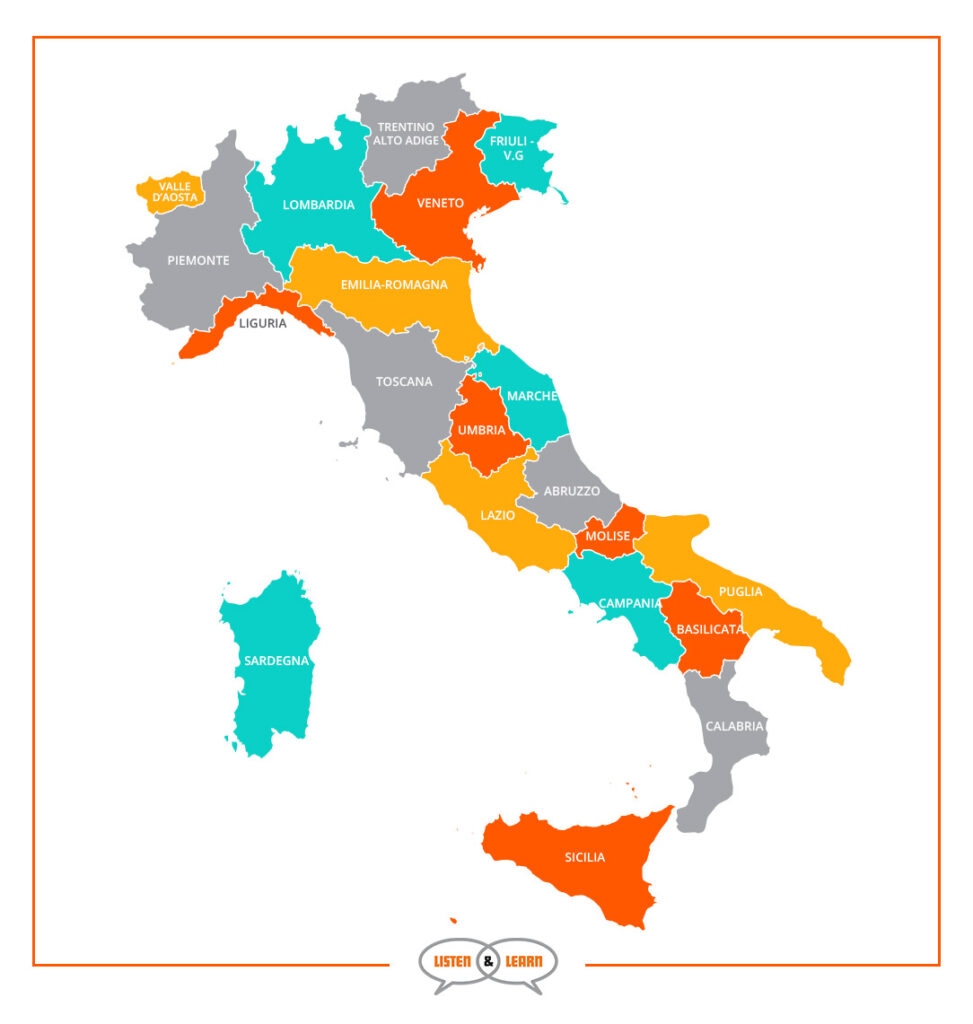5 Things Expats in Italy Should Know (But Usually Don’t)
Living in Italy offers expats a life of cultural richness in a country that has a fascinating sense of history. Once home to groundbreaking painters and ancient civilizations, present-day Italy boasts world-class gastronomy, lush vineyards, and of course, an ever-present air of romance.
Complemented by a thriving economy and a rich and lively culture, it is clear why Italy is such a popular destination for immigrants from all over the world.
However, even after living in Italy for 5, 10 or 15 years, there are many expats that are not familiar with some of the most fascinating aspects of life in Italy.
If you’re planning to move to Italy or have been living here for a while and feel like you’re still missing out on a lot of things, we’ve got you covered! Below, you’ll find 5 things that will make the lives of expats in Italy easier and more enjoyable.
Table of Contents
→Sign Up Now: Free Trial Italian Lesson With a Native Speaker Teacher!←
1. The Right Way to Greet People
If a firm, strong handshake is not your forte, you don’t need to worry. As soon as you arrive in Italy, you will see that it’s much more common to greet people with a kiss on both cheeks. No, not only friends… Yes, strangers too… Yes, even in post-Covid times.
No, seriously. Though it may sound a bit irresponsible to be kissing strangers in the context of a global pandemic, we are not talking about a full kiss on people’s faces. This is a type of kiss that even expats who have been living in Italy for a long time have trouble figuring out. If you have given up and now just stand there, letting the other person do the kissing, we’ve got you covered!
The kiss Italians use to greet each other is more like an “air kiss”. It is known as il bacetto (a little kiss), and it doesn’t imply actual lip-cheek contact. All you have to do is make a “mwah” sound while you approach your target’s face and then stop a few inches before your mouth actually touches their skin!
Worried about hitting a stranger’s cheekbone with your jaw by going the wrong way? To avoid this type of accident, just start with the right cheek and then move on to the left, which is how it is traditionally done by people living in Italy.
2. The Italian National Anthem
Expats in Italy often assume that learning the basics of the language (and sometimes not even that!) is enough to mingle with the crowd. However, it is cultural differences that are most likely to make you feel left out.
If you’re living in Italy, learning the Italian National Anthem is essential so it won’t take you by surprise when you hear it in a football match, a school event, or a local parade and everyone is singing but you. In this way, you’ll be able to blend in with locals.
In fact, it won’t hurt to delve into the history behind this beautiful piece of music:
“Il Canto degli Italiani” (“The Song of the Italians”) is a canto composed by Michele Novaro and penned by Goffredo Mameli in 1847, and it is the official national anthem of Italy.
Best known as the “Inno di Mameli” (“Mameli's Hymn”), the song gained popularity during the unification of Italy, but was eventually considered too progressive: the line Fratelli d'Italia (brothers of Italy), after which the piece is also sometimes called, was seen as having a clear republican and revolutionary subtext, so it was seen as unsuitable to represent its political system, which was then a monarchy.
It was after World War II, when Italy became a republic, that “The Song of the Italians” regained popularity. In October 1946, it was chosen as a temporary national hymn, and after several decades marked by fruitless attempts to make it official, it finally gained de jure status in November 2005.
Now that you know the history behind the Italian anthem, are you ready to memorise its chorus?
Stringiamci a coorte,
Let us join in a cohort,
siam pronti alla morte.
we are ready for death.
Siam pronti alla morte,
We are ready for death,
l'Italia chiamò.
Italy has called.
Stringiamci a coorte,
Let us join in a cohort,
siam pronti alla morte.
We are ready for death.
Siam pronti alla morte,
We are ready for death.
l'Italia chiamò!
Italy has called!
3. Basic Italian Geography
Do you already have visions of you and your family living in Rome, but don’t know any other place in Italy? Or maybe you have already been living in Italy for a long time and never got the chance to learn the name of any of the regions?
Italians are very proud of the place they are from, so you are likely to hear this topic coming up in different conversations all the time. If you’re not familiar with the names and locations of the regions, you will be just standing there with a confused look on your face when this happens. Doesn’t sound great, does it?
Here are the basics of what you need to know about the map of Italy.
As we said before, Italy became a unified nation in 1861. Before that, it was divided into kingdoms and republics, each one with its own administration, language, and currency. This explains why, even today, traditions, food, and accents vary so greatly from region to region.
In present-day Italy, there are 20 regions that are autonomous entities with defined powers. With the exception of the Aosta Valley, each region is in turn divided into different provinces.
Here you have a map so you can get started studying it:
 For all these reasons, expats in Italy will find that they’ll need to learn not only Italian traditions, but also the specific uses and customs of the region where they choose to relocate, as well as have an idea of what’s going on in the rest of the country.
For all these reasons, expats in Italy will find that they’ll need to learn not only Italian traditions, but also the specific uses and customs of the region where they choose to relocate, as well as have an idea of what’s going on in the rest of the country.
4. Eating Out Italian Style
It might take you a while to learn the most intricate of Italian traditions, but there are a couple of things that you should know as soon as you start living in Italy. Food is at the centre of Italian culture and getting all the traditions around it right will make you look good in front of the locals. Let’s see some of the customs you can implement right away!
- While tap water is perfectly safe to drink and Italians usually have lots of it at home, you should never order it in a restaurant. This is, of course, unless you want to receive a diatribe from the waiter on how tap water will spoil your delicious and carefully prepared meal. If you want to avoid this kind of lecture, just ask for bottled water, either naturale (still) or frizzante (sparkling).
- Yes, Italian cheese is glorious. It is so delicious that you’ll want to use it in all of your meals. However, if you want to avoid giving Italians an unnecessary heart attack, try not to put parmigiano While grated cheese agrees perfectly with pasta or risotto, Italians never use parmigiano with fish or seafood, salads, or pizzas. So, how will you know if it’s OK to use grated cheese? Easy: If the waiter doesn't offer or bring it, it means you’re not supposed to use it with that particular dish.
- Don’t (don’t!) cut your pasta with a knife. The only utensil you’re expected to use with your spaghetti is a fork. Otherwise, instead of being expats in Italy, you and your family will soon be deportees from Italy.
- Everyone who has been living in Italy for some time knows that the chef is always right. If your salad only has oil and vinegar, then that’s what it’s supposed to have. Asking for special dressings or seasoning your food at the table is simply unacceptable.
5. Fluent Italian
You might be able to get by with ciao and other basic phrases for the first few weeks, but if you’re going to be living in Italy for good, you will want to learn more vocabulary so you can socialise, avoid communicative mishaps, and of course, get a nice job.
I mean, just think of all the things you will need to do as a resident while living in Italy! From getting a driver’s licence to enrolling your children in school or getting car insurance, if you want to cope with the linguistic demands that fully adapted expats in Italy face every day you, will need to learn advanced Italian with different resources.
→Sign Up Now: Free Trial Italian Lesson With a Native Speaker Teacher!←
While watching Italian television, listening to language-learning podcasts or reading articles on how to avoid common mistakes are all very helpful techniques, if you really want to see amazing progress you will need to take a course with a native Italian teacher.
Luckily, we can help you with that. Contact us and we will pair you up with an Italian tutor that will teach you everything you need to know to meet the linguistic and non-linguistic demands of living in Italy as an expat. Reach us now and get a free trial lesson, no strings attached.



